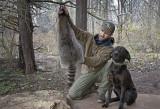
For as long as I knew her, she was ready to die. Damn her. No one treasured work, love, laughter, family, and devotion more than she did. But for her last 30-plus years, if the bucket were sitting there, you knew she would kick it without fear.
Loved ones saw no bravado in her attitude. That was just her way. She knew life and death to be impartial, and that once she passed 60, she “dasn’t” ask for much more, lest she appear ungrateful.
But she would occasionally let down just enough to hint that she had kept score. She told of life in the early 1900s, when chronic asthma kept her stooped and wheezing, and ignorant neighbors warned sons to keep their distance.
“There goes the walking dead girl,” they said. “Probably has TB. Don’t want to marry her. She’ll die young on you.”
She outlived all those people, parents and sons alike.
Maybe she survived because she never took anything for granted. Later, after becoming a mother and finding her husband to be an irregular mate and father, she raised four kids mostly on her own through the Depression. When her children became adults and teased her about living off tomato soup during their childhood, she replied, “You didn’t starve, did you?”
Still, she valued fresh meat in her home. She told grandkids how her brother often provided their only meat some weeks: rabbits from fencerows and bullheads from nearby lakes.
In her era, meat seldom came wrapped, including chicken, which they butchered themselves. If families in her early-1900s neighborhood wanted meat, they usually drew the knife or swung the cleaver on the animal carrying it.
When reflecting on those times late in life, she scorned contemporary hindsight when people clucked their tongues about the “wanton killing” of deer and ducks all those decades before. She said little wildlife went to commercial uses, at least not where she lived in southern Wisconsin. For many rural or edge-of-town families, wildlife and wildfowl provided rare sources of meat. They were so poor and hungry that wildlife conservation had to await more prosperous times, or when people had no other choice but restraint. Even then she wasn’t confident conservation would remain in vogue if times grew rough again.
Such matters made her despise waste throughout her life. Whether it was food, time, money, or talent, she strived to pass on those hatreds to her descendants. When a grandson took up hunting and fishing, she ensured his meager catches were cleaned and eaten. That wasn’t hard for her to monitor. After all, she lived with her grandson’s family most of her final 30 years and knew when to slip into sermon or skip to the next page.
When she was left home to cook for her grandkids, she quietly directed the young hunter toward the freezer. “Don’t let your brothers and sisters see you,” she whispered with an amused look. She then prepared her standard chicken dish, adding every chunk of rabbit and squirrel after plucking the No. 6 pellets.
While washing the dishes after supper, she relived her trick with the boy, saying with a laugh, “Well, they’d argue if they knew what was in it, maybe just to spite you. But it’s better meat than we can buy in a store.”
She valued her independence, but unlike many she knew toil, knowledge, and responsibility made it possible. She never relied on stores for all her food. Instead she planted and tended huge berry patches and vegetable gardens, moving in quickly after each rain to pull and hoe weeds while the ground was soft.
She also kept buckets and barrels beneath eave troughs to collect rain for her plants. On the property’s border she piled fallen leaves and grass clippings onto huge compost piles, a task so routine that she laughed when smaller musty heaps became a 1980s trend for yuppies.
All the while, she never shied from politics nor religion. When age made her too weak to work outdoors, she crocheted while watching “Meet the Press” and “Face the Nation” on Sunday mornings, and cable TV’s screamers on weeknights. But she confided to a daughter-in-law that life stopped being fun after 88, when aging’s many pains never ceased.
Still, it took a fall from a nursing-home bed, which broke her hip at age 96, to finish her on March 28, 1994.
She’s now buried inside a cedar-rimmed cemetery in a plot she chose long before her grandchildren were born. Ursula Fischenich Durkin was one hell of a woman, and at least one grandson will never forget her lessons and “chicken” dinners.
Feature image Ursula Fischenich Durkin, in about 1918 at age 20.





